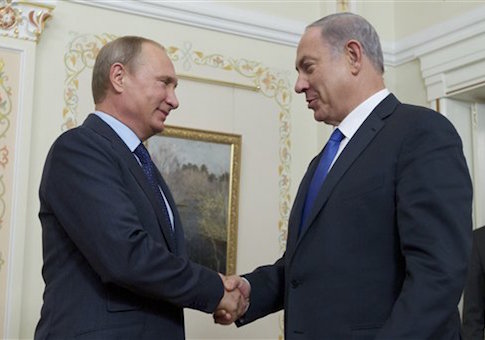
It speaks volumes that Russia, rather than Israel, has been going public with details of a “hotline” and joint air exercises they have launched to avoid an accidental clash in the skies over Syria.
Israel is unusually tight-lipped about the military coordination, a reticence that officials and experts say stems in part from reluctance to signal any significant strategic shift away from the United States, its key ally but one that has reduced Middle East engagements as Russia steps up its own.
In a three-week-old campaign, Russian aircraft have backed up Syrian President Bashar al-Assad’s troops as they try to regain ground lost to rebels during a civil war raging since 2011.
Russia has also sent in advanced air defense systems, fuelling concern that its forces could accidentally clash with jets sent by Israel or the U.S.-led coalition.
“We don’t interfere with them and they don’t interfere with us,” Defence Minister Moshe Yaalon said in a radio interview, tersely summing up Israel’s accommodation with Russia.
Another reason Israel is holding back is because it does not know the full extent of Russia’s plans for Syria or what effect they could have on Assad’s allies – Iran and the Lebanese guerrilla group Hezbollah.
A de-facto axis between Moscow and Israel’s two most powerful regional enemies could seem an unsettling scenario for Prime Minister Benjamin Netanyahu’s government but it might also be seen as providing a moderating influence.
“The new order in the Middle East is loose coalitions for specific purposes, so a Russian partnership with Iran and Hezbollah to save Assad is not necessarily bad for us,” a Netanyahu confidant told Reuters on condition of anonymity.
Russian President Vladimir Putin “is not looking to mess with Israel, and it’s unlikely he would look kindly on Iran or Hezbollah messing with Israel now, either,” the confidant said.
The assurance has been echoed by Russia, which hosted Netanyahu for Syria “deconfliction” talks on Sept. 21.
It took until this week for the United States, whose forces have long been in sync with Israel on Syria, to agree on similar coordination with Russia.
Alexander Shein, Russia’s ambassador to Israel, said his country’s operations were limited to air and missile strikes on “terrorist groups.”
“In this context there is no reason to talk about any alliance between the Russian side, Hezbollah and the Iranian side in Syrian affairs,” he said in an emailed response to questions from Reuters.
CIRCUMSPECT ON ASSAD
Shein said Russia was familiar with the reasoning behind past Israeli air strikes in Syria, including against alleged arms transfers by Iran or Assad’s army to Hezbollah, and “fully aware of Israel’s strategic importance in the Middle East.”
But he said Syria’s neighbors and overall regional stability were threatened by the conflict, suggesting Israeli security might be best served by an Assad victory.
Israel called for Assad to be ousted after the civil war began but the Netanyahu government has recently preferred neutral rhetoric even though Western powers continue to demand an eventual change of leadership in Syria.
Exhausted by feuds with Washington over Iran’s nuclear drive and now-frozen peace talks with the Palestinians, Israeli officials privately acknowledge being circumspect on Syria although they believe Assad’s staying power has improved because of Russia’s aerial campaign.
Moscow, meanwhile, has made no secret of seeing vindication for its Syria strategy in the Netanyahu government’s posture.
“Israel’s prudence from the outbreak of the conflict in Syria has become apparent in the fact that Israel did not consider the overthrow of President Assad as an indispensable condition to avoid foreign intervention and impediment for the beginning of a national reconciliation,” Shein said.
He linked this to what he described as Israel’s “wisdom” in not taking sides when Russia seized the Crimea region from Ukraine last year following the removal of a Ukrainian president who was sympathetic to Moscow.
“I hope it reflects concern for the development of Russian-Israeli relations in a true, friendly and cooperative manner,” Shein said.
Israeli officials have spoken respectfully, but not lavishly, about their evolving relationship with Russia.
A diplomatic dividend such as Russian recognition of Israel’s annexation of the Golan Heights, captured from Syria in a 1967 war, is nowhere on the horizon, and Moscow’s growing relationship with Iran worries the Netanyahu government.
Yaalon suggested Iran could, following the deal with world powers over its nuclear program that offers sanctions relief, buy up to $21 billion of arms from Russia. Citing this prospect, he said he would try to secure increased U.S. defense aid for Israel when he visits Washington next week.
“Despite all the arguments we have with the United States, it is, ultimately, as an ally, the cornerstone of our strategy,” Yaalon told Israel’s Army Radio.
REUTERS

Leave a Reply
You must be logged in to post a comment.